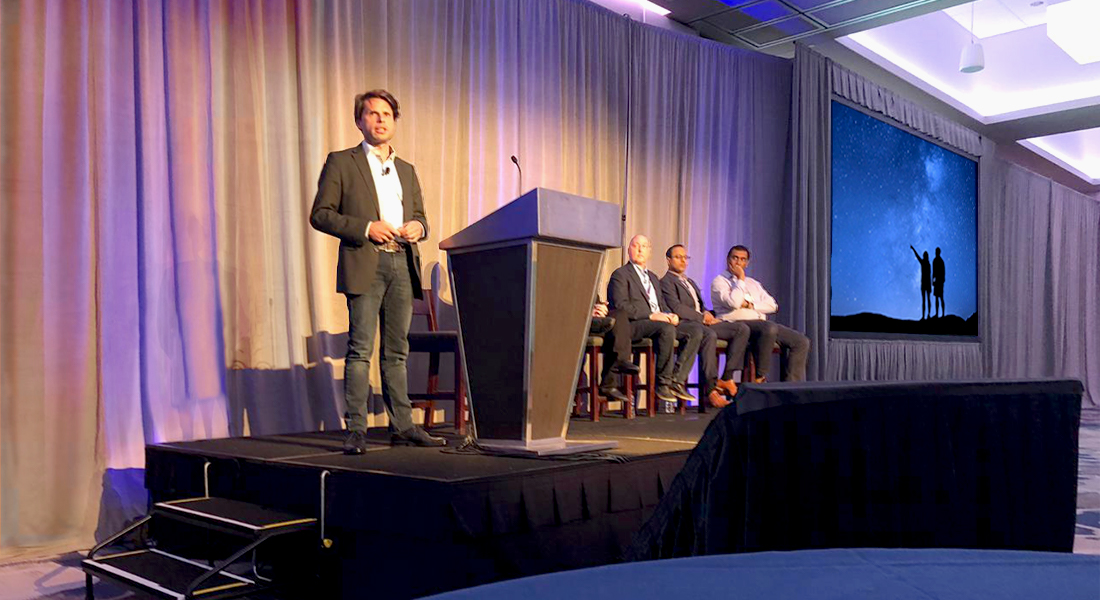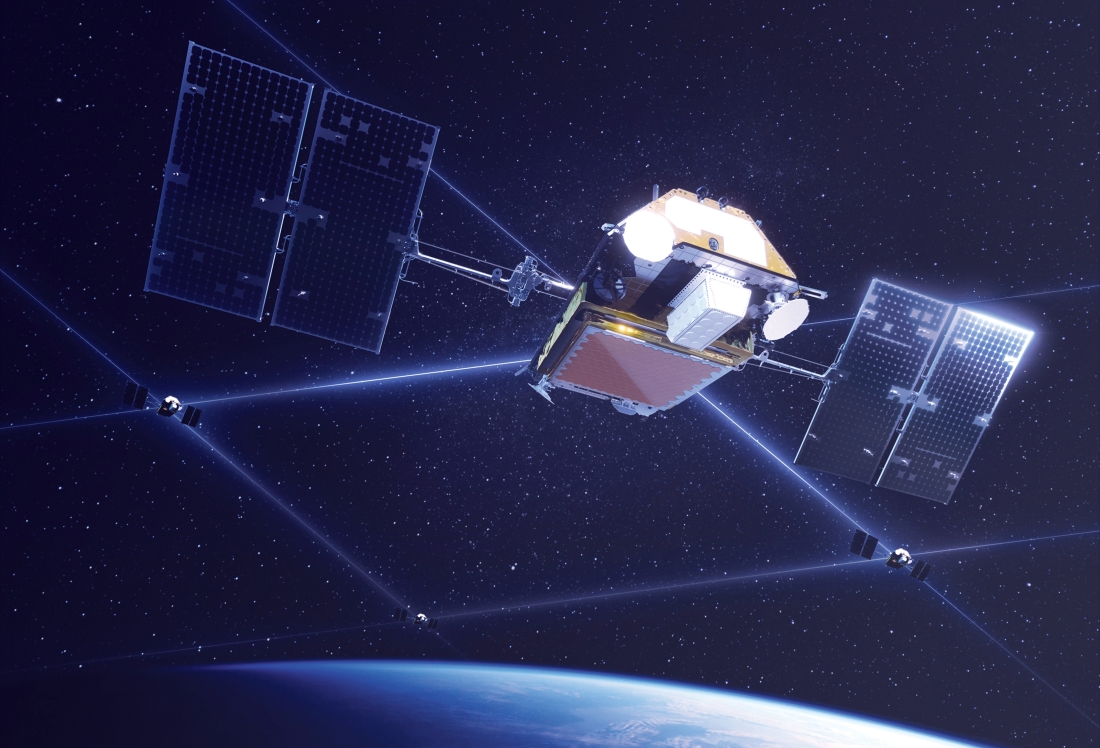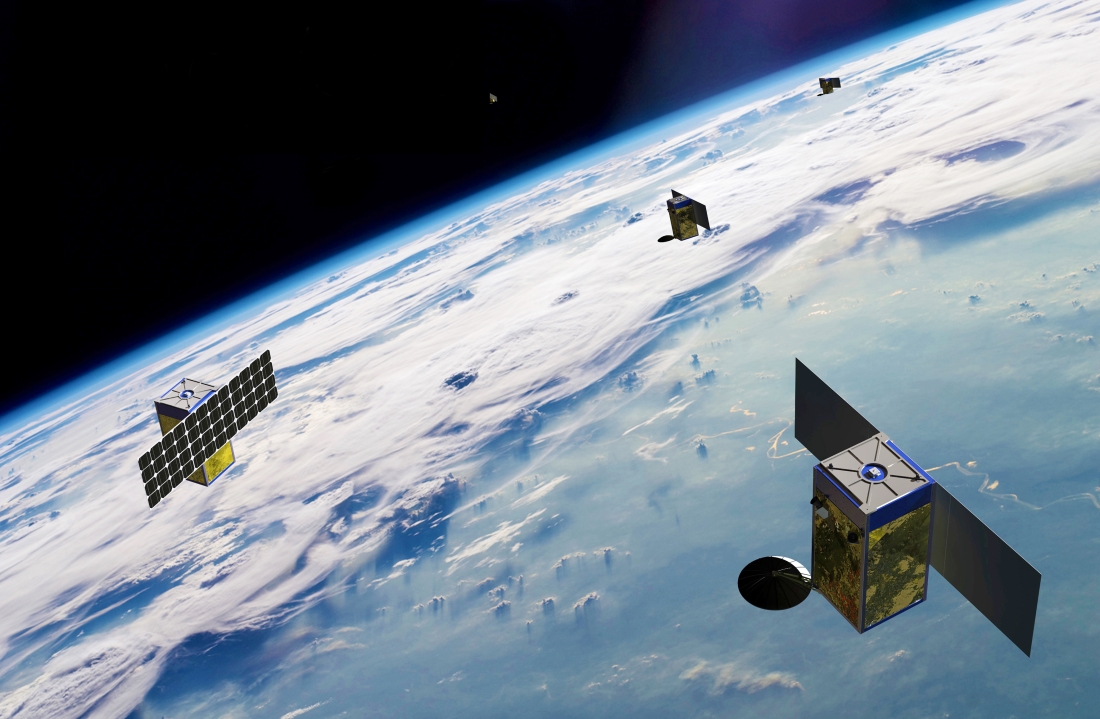When established space companies and startups team up!

The communications satellite market has been undergoing deep changes in recent years. We are seeing the emergence of new players, especially startups, which are likely to introduce new technologies and new production approaches. Telecom operators are in a "wait and see" momentum towards upcoming investments, as they consider these new business models. Legacy manufacturers are changing as well, to address new market expectations, while projects continue to spring up within the scope of the New Space environment.
At the New Space Conference in Seattle from July 15 to 18, Vincent Clot, Business and Open Innovation Director for Thales Alenia Space, participated in a panel discussion on the investment outlook in the space sector. Alongside venture capital firms and startups, Vincent highlighted the synergies that could come into play between established manufacturers and startups, capable of offering disruptive solutions that could displace existing models.

While there are an increasing number of these linkups, not all will come to fruition. According to Vincent, “The best guarantee of ongoing and effective innovation is for legacy manufacturers to team up with the most promising startups, at all stages of development, not only in the initial phase where innovative ideas take shape, but also on projects that are well under way. Startups could thus take advantage of the technical and human expertise offered by a major corporation, which in turn supports the startup in successfully developing its solution, and then integrates it in its development strategy.”
Thales Alenia Space, a forerunner in New Space

Iridium NEXT © Thales Alenia Space/Master Image Programmes
More than 70% of the constellations now in orbit were built by Thales Alenia Space as prime contractor. We have successfully conducted iconic programs such as Globalstar 2 (24 satellites), O3b (20 satellites) and Iridium NEXT (81 satellites) – a total of 125 satellites in three constellations. So it looks like Thales Alenia Space was defining New Space paradigm even before the term became known!
We have leveraged our expertise in constellations to address three New Space developments. For NorthStar, BlackSky and Kinéis, Thales Alenia Space submitted competitive proposals based on disruptive solutions tailored to each specific requirement.
Time for New Space
Thales Alenia Space teamed up with American startup Spaceflight Industries to create LeoStella LCC, an equally-owned joint venture at the heart of the New Space environment. Its objective is to build BlackSky, the first constellation featuring short revisit times, with 60 high-resolution optical observation satellites.

Kinéis © CLS
We are also the system architect for Kinéis, a constellation of nanosatellites dedicated to the Internet of Things, built jointly with Hemeria for CLS.
In 2018 the Space Alliance took a stake in NorthStar Earth & Space Inc., a Montreal-based information services company that is developing the world’s most advanced environment and near space surveillance system. In other words, a system that will monitor space from space. The Space Alliance between Telespazio and Thales Alenia Space will provide NorthStar with solutions for the design, development and production of a unique constellation of 40 satellites.

NorthStar © NorthStar Earth & Space Inc.
In addition, Thales Alenia Space is also supporting French startup Exotrail in the development of electric thrusters for small satellites.
Investing in innovation
In 2014, Thales Alenia Space launched the Innovation Cluster, an entity combining innovative approaches from both the legacy and New Space environments. Focused on generating value right from the outset, the Innovation Cluster organized its innovation investment strategy both in-house and externally, covering both evolutionary and revolutionary approaches.
In-house, the Innovation Cluster is an incubator for Thales Alenia Space’s innovative projects, based on essential medium-term objectives. It applies the same principle as in startups: kickoff, followed by a ramp-up, leading to a product line, or to continued development with strategic and/or financial partners.
Externally, the Innovation Cluster developed an “Open Innovation” approach to foster partnerships with partners outside the company. We identify the startups that are most likely to become suppliers or partners, or with which we would consider strategic links, including cross-shareholding, then monitor and analyze them to eventually apply the appropriate measures. Thales Alenia Space takes a strategic approach, including a human investment based on contributing technical and commercial expertise. Given the dynamic nature of the New Space environment, Thales Alenia Space is seeking all the more to minimize risks by making the right choices. However, this doesn’t stop us from investing in what we have identified as growth markets, as shown by the creation of the LeoStella LCC joint venture, tasked with building a constellation of high-resolution observation satellites.

BlackSky © Leostella LCC
Collaboration can also take the form of support without a capital investment, especially for potential suppliers. That will help startup partners rise up the skills chain, as both parties develop their mutual understanding. This could be the first step in a “derisking” strategy, based on an evaluation of proofs of concept, or the application of a specific process to mature a concept or a product, an approach currently applied at Exotrail. It could also entail our participation in Thales incubation programs, such as Station F for cybersecurity with KETS, for example, or Centech for artificial intelligence with Delfox.
In short, it is imperative that Thales Alenia Space and the Innovation Cluster stay in constant touch with startups and the innovation ecosystem to identify and select the most pertinent candidates and to foster a productive relationship with internal startups or traditional entities, all with the aim of creating a win-win relationship for all parties involved.

